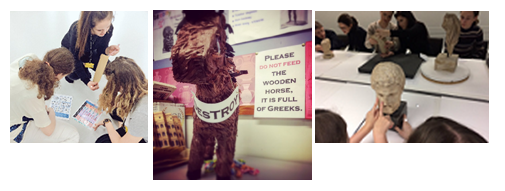Classical Civilisation
| Curriculum Intent and Overview | |
|---|---|
| Classical Civilisation A Level is designed to challenge all students by immersing them in the ancient world through a variety of perspectives. There is an ambitious curriculum with cross-curricular ties and a breadth of skills linked to various subjects such as English, History, Politics, Philosophy, Art and Sociology. The accrual of cultural capital is supported through the careful choice of options chosen in addition to topics linked to contemporary debates and concepts such as gender equality, dictatorships, rhetoric, religion, identity and morality. | |
|
|
|
The Department
Miss M Warner Smith, Lead Practitioner for Classics
A Level
Exam Board: OCR
Specification Number: H408/11, H408/22, H408/31
Course content:
Classical Civilisation A Level is studied via the three named modules below; these units are examined at the end of Year 13. Students will study some of the most fascinating aspects of the ancient world: epic tradition and the world of mythical heroes, gods and monsters; exploring religion in all areas of Greek society; and analysing Roman imperial propaganda.
Our three modules for examination are:
- The World of the Hero - 40% (Homer's 'Odyssey' and Virgils 'Aeneid')
- Imperial Image - 30%
- Greek Religion - 30%
Assessment:
Classical Civilisation is taught in a variety of ways, including class discussion of texts, creative presentations, detailed analysis of ancient artefacts, one on one feedback, and intense exam style practise. Throughout the course students will get to engage with a wide range of digital resources as well as having the opportunity to visit sites outside of school to embrace studies of Classics outside the classroom where possible.
Why Classical Civilisation at St Albans Girls’ School?
Students should study Classics at St Albans Girls' School as it is a rare opportunity to learn about the ancient world. Students are supported with Google Classroom forums where resources are available to extend and help reinforce learning and facilitate peer discussions.
Expectations of students:
An interest in literature and myths, an intrigue about past cultures and civilisations and a desire to analyse ancient sources are essential qualities for a Classics student. Practically, students are required to fully prepare for lessons, for instance carefully reading their key texts as well as wider literature, constructing organised notes and submitting essays/work on time with 100% effort. The language of Classical epics (Homer and Virgil) can be complicated and students taking this course need to be resilient in their learning and prepared to put in the time to grapple with both the nuanced descriptions and basic narrative of the texts. Classical Civilisation A Level teaches the skills of analysis, attention to detail and the ability to put forward a balanced and critical argument. Students are encouraged to vocalise and challenge ideas in class, both in debate and when constructing formal presentations.
What websites are recommended?
OCR Exam Specification Linear A Level
The 'Odyssey' and the 'Aeneid'
What equipment is needed?
- Key texts for given modules (including Rieu's translation of 'The Odyssey' and West's translation of 'The Aeneid')
- OCR support guides for the three modules (optional)
Career Paths:
Classical Civilisation A Level is recognised by all universities as an eye opening, multi-disciplinary course enabling students to formulate a range of key vocational skills. Opportunities for future study and employment cover both academic and artistic fields including politics, journalism, architecture, law, education, the civil service and archaeology to name but a few.
